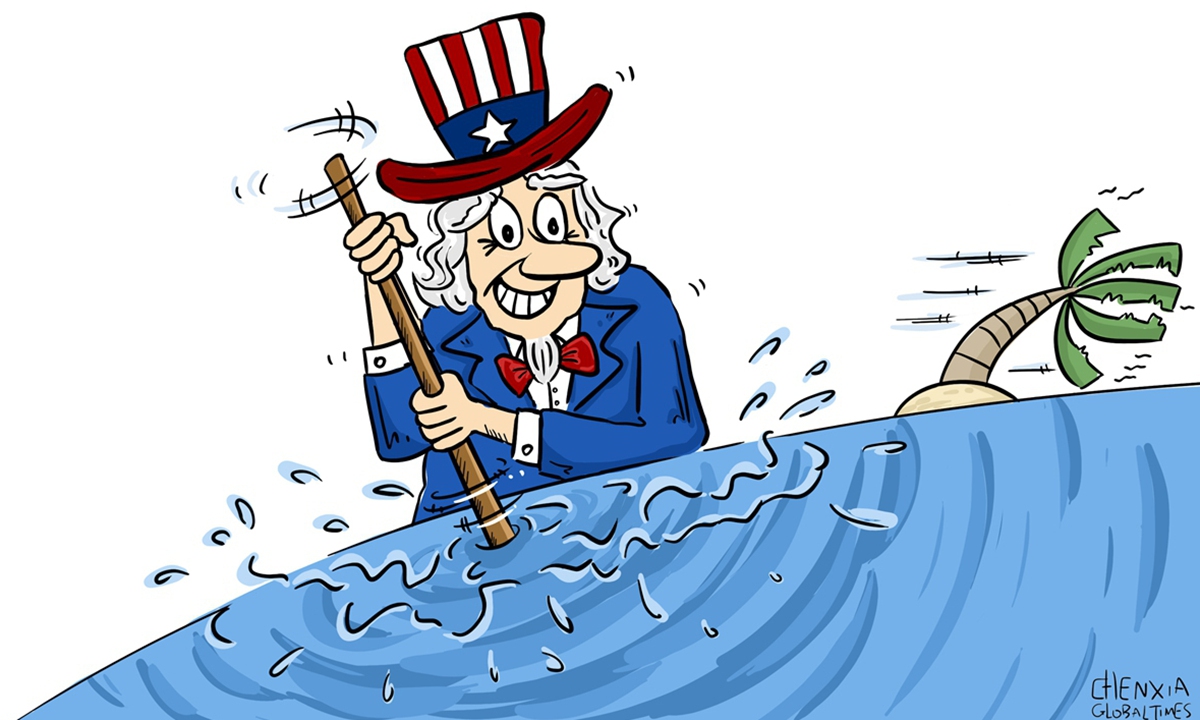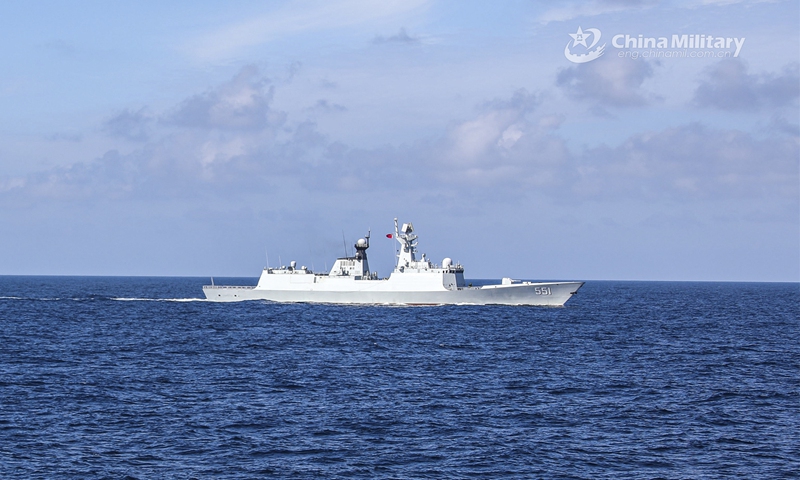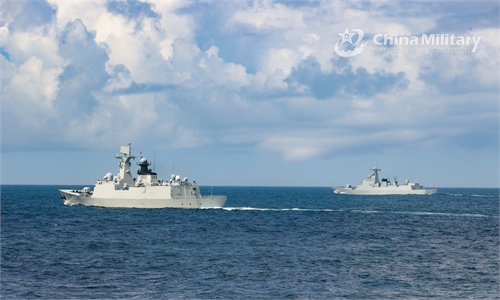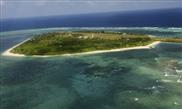PLA slams US Navy ship for illegally intruding into water near Ren'ai Jiao, violating Chinese sovereignty, regional stability

Illustration: Chen Xia/GT

The guided-missile frigate Suining attached to a frigate flotilla with the navy under the PLA Southern Theater Command steams at an undisclosed sea area during a maritime combat training exercise in mid July, 2023. (eng.chinamil.com.cn/Photo by Ge Hanqiang and Zhang Weifeng)
Chinese experts believe that the US intended to create tension and thus strengthen the Philippines' loyalty to Washington, thereby destabilizing the prosperity of the Asia-Pacific and better advancing Washington's "Indo-Pacific strategy." The Philippines' recent moves over the South China Sea show that Manila currently lacks rationality and balance, which means regional countries should be better prepared with "bottom line thinking" for further possible provocations by the Philippines.
The USS Gabrielle Giffords littoral combat ship on Monday illegally intruded into waters adjacent to Ren'ai Jiao without authorization from the Chinese government, and the PLA Southern Theater Command organized naval forces, tracked and monitored the US vessel throughout its entire course on high alert, Senior Colonel Tian Junli, a spokesperson at the PLA Southern Theater Command, said in a statement on the day.
It appears to be the first time the PLA Southern Theater Command has issued a statement on a US warship trespassing into waters off Ren'ai Jiao, observers said. The PLA Southern Theater Command has previously issued statements whenever a US warship intruded into waters off China's Nansha Islands, but no names of exact islands and reefs were made available.
It was an intentional move by the US that stirred up tensions in the South China Sea, seriously infringed on China's sovereignty and security, seriously sabotaged regional peace and stability, seriously violated international law and basic norms governing international relations, and fully showed that the US is the biggest threat to peace and stability in the South China Sea, Tian said.
China has indisputable sovereignty over the South China Sea islands and their surrounding waters, and troops are kept on high alert at all times so as to resolutely safeguard national sovereignty, security as well as peace and stability in the South China Sea, Tian said.
The US move came amid rising tensions between China and the Philippines due to Manila's constant provocation over the sovereignty of Ren'ai Jiao since August, as Manila made several attempts to send building materials to reinforce an old Philippine warship illegally grounded on the Chinese reef since 1999, and saw its efforts blocked and restricted by countermeasures by the China Coast Guard.
Citing a public affairs officer for the US 7th Fleet in Yokosuka, US media reported that Washington believed they were conducting routine operations with "freedom to navigate."
The US warship added fuel to the flames and sent a wrong signal to the Philippine side, a Chinese military expert who requested anonymity told the Global Times on Monday.
From the start, the Philippines' recent provocations on Chinese islands and reefs were instigated by the US, so the US can take advantage of the Philippines' territorial claims to enhance its own military presence in the region to better contain China's military movements along the "first island chain," the expert said.
Chen Xiangmiao, director of the world navy research center at the National Institute for South China Sea Studies, told the Global Times that a littoral combat ship is a lightweight warship that is not suitable for modern naval combat, but rather for close-in reconnaissance and other missions that have strong diplomatic and political goals.
US warship activities cannot change the fact that Ren'ai Reef belongs to China, Chen said.
According to Li Haidong, a professor at the China Foreign Affairs University, the US intention is to further strengthen its alliance in the "Indo-Pacific strategy" by creating regional tensions to reinforce the Philippines' loyalty, as well as to create resentment against China among other regional countries.
The US' creating tensions on China-related issues is actually a move that sows seeds of crisis, which will damage prospects for peace and stability in the Asia-Pacific, Li said.
Losing balance
Before the US' Navy ship's provocative actions, Philippines Coast Guard hyped on Sunday that "more than 135" Chinese vessels were "swarming" a reef in the South China Sea, namely the Niu'e Jiao, describing it as "alarming," according to media reports.
In response, Chinese Foreign Ministry Spokesperson Wang Wenbin said at a Monday press briefing that Niu'e Jiao is part of China's Nansha Islands, and the relevant waters of the South China Sea, including Niu'e Jiao and its adjacent waters, have always been an important operating area and shelter for Chinese fishing vessels.
"It is reasonable and lawful for Chinese fishing vessels to operate in those waters and take shelter there, and the Philippine side should not make thoughtless remarks about it," Wang said.
Meanwhile, the Philippines opened a new coast guard monitoring base on an occupied island in the South China Sea on December 1, and plans to expand joint patrols with the US and Australia to counter China, according to Associated Press.
Unlike most ASEAN members, as a country at the forefront of geopolitical tensions, unfortunately, the Philippines is gradually losing balance and rationality in its policy, said Li Kaisheng, vice president of the Shanghai Institutes for International Studies.
Sovereignty disputes among countries are normal and should be resolved through peaceful negotiations and consultations. Attempts to increase leverage by bringing in external forces will have serious consequences for the regional security situation, such as upgrading sovereignty disputes into geopolitical crises and weakening ASEAN's unity and centrality, according to the expert.
In addition, a more likely outcome for the Philippines will be to become a tool and a victim of the great power game, said Li. "The US vessel has brought only superficial comfort and de facto trouble to Manila," he added.
According to Li Haidong, the Philippines is currently presenting a posture to maintain its stand-off with China by colluding with the US. But bringing US forces into the Asia-Pacific and turning the region into a powder keg is something that all parties and peace-loving people do not want to see.
He said what the Philippines needs is a pragmatic, rational and prudent foreign policy, and that the relatively sober and calm politicians in Manila should check and balance the hawks in the country.
However, it can't be ruled out that the next move by the Asia-Pacific country could be even more irrational, the expert said, noting that regional countries need to be fully prepared with bottom-line thinking for the Philippines' further provocations in continually creating crises in the Asia-Pacific and undermining decades of peace and prosperity.




